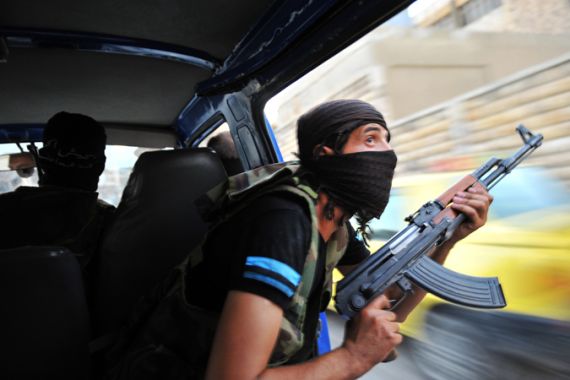Stalemate stokes anger at rebels in Aleppo
Many Syrian residents are fed up with rebel fighters as the conflict drags on in the once-thriving commercial centre.

Aleppo, Syria – On the surface, life appears normal in opposition-held districts in Aleppo, Syria’s war-torn commercial capital. Bustling crowds pack markets, and traffic congests its main streets.
But the scene of ordinary life is dangerously deceptive, as at any given moment a Syrian fighter jet or artillery shell could strike the urban centre and incinerate the precarious normality.
Few Syrians, however, complain about shelling and air strikes here these days. Their main concern is providing their families with food.
“We can’t find bread and when we do, we can’t afford to pay for it. The price has increased at least three-fold,” resident Mohammed Ali told Al Jazeera.
He blamed the rebels for his misery. “They promised that they would make sure that basic commodities are available. They aren’t able to do that. They don’t even subsidise the prices,” he said. “The rebels should get rid of the corruption in the city before they fight battles elsewhere.”
|
“Our country is being destroyed. If this is the revolution, I don’t want it.“ – Mohammed Zein, Aleppo fruit seller |
Many residents of the city feel the same way, with little criticism against the Syrian government now overheard in conversations on the streets. Indeed, public anger now is firmly directed towards the rebel forces.
Once a thriving financial centre, Aleppo is that no longer. Rebels stormed the city in mid-July and were able to set up bases in the poorer, mainly Sunni neighbourhoods. Syria’s opposition is mainly made up of Sunnis, but Aleppo’s multi-ethnic and multi-class make-up hasn’t always worked to the benefit rebel fighters.
Aleppo stalemate
The city is now carved up into government- and opposition-controlled districts, with battle lines in some quarters drawn only metres apart. For weeks there has been a stalemate with both sides unable to make any major territorial advances.
The deadlock has led many Aleppo residents to complain about how their lives have deteriorated, with some questioning whether the war is worth its consequences.
“It will end when the war in Iraq ends, and they have been at war for ten years now,” says Mohammed Zein, a 64-year-old vegetable vendor.
“Our country is being destroyed. If this is the revolution, I don’t want it. I have to stress that I am not a supporter of the regime, because they used to oppress us. But now, we are being oppressed 100 times more.”
|
Al Jazeera’s Zeina Khodr on Aleppo situation |
The opposition has acknowledged some of its fighters have profited from the war, but said it is tackling corruption among its ranks and blamed the government for the people’s lack of basic necessities.
“We are doing our best, but the regime has laid siege to the city. They don’t allow supplies to get in. They stop people at checkpoints and confiscate their goods if they are trying to enter Aleppo,” said Abdul Raouf Sabouni, an opposition fighter.
Sabouni is a member of a brigade operating under the Free Syrian Army (FSA) command. But the FSA – considered to be the mainstream rebel group in the country – is fast losing influence and support here.
“The FSA are thieves … We don’t want them. We want Jubhat al-Nusra to rule,” a crowd chanted during a demonstration following Friday’s midday prayers, referring to a hardline Islamist group – one the United States has linked to al-Qaeda.
Rise of hardline Islamists
Fighters from Jubhat al-Nusra appear to be the dominant force, not only in Aleppo, but on other battle fronts across Syria.
Some say Jubhat al-Nusra’s members are doing the hard fighting on the frontlines, and are viewed to be more disciplined and less corrupt than the Free Syrian Army, with which it works independently.
One of the demonstrators even accused some FSA fighters of collaborating with forces loyal to President Bashar al-Assad.
|
“The rebels promised to bring freedom but there is no safety. They promised us better lives, but we aren’t even able to afford to buy bread.“ – Mohammed Ali, Aleppo resident |
“The Free Syrian Army needs to cleansed from bad elements who are working with the regime. They are kidnapping, robbing. This has to stop,” Abu Hamze said.
It is hard to gauge how much influence Jubhat al-Nusra wields with Aleppo’s population, but what is unambiguous is FSA’s declining popularity here.
“This is always the case in cities,” a Syrian from Damascus, who asked to remain anonymous for security reasons, told Al Jazeera. “The people of Aleppo are businessmen. All they care about is making money. They don’t want to be involved in any war. They may not like the regime, but they want others to do the fighting … others to suffer.”
Aleppo was long immune from the fighting in the countryside. Unlike other areas in Syria, its people didn’t rise up en masse when rebels brought the fight here. At the time, this failure disappointed many opposing Assad’s regime. But now, it seems, it is the opposition to Assad that is disappointed with Aleppo.
“We used to work and have jobs. We just want to live in peace,” Mohammed Ali said. “The rebels promised to bring freedom but there is no safety. They promised us better lives, but we aren’t even able to afford to buy bread.”
Follow Zeina Khodr on Twitter: @ZeinakhodrAljaz